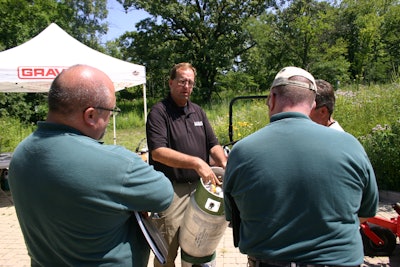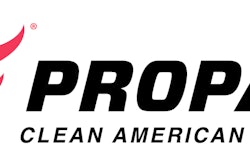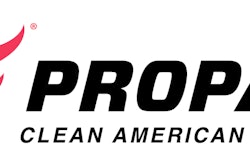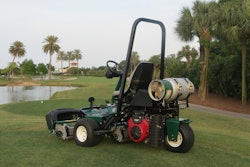
Dealer Mike Halloran was one of several experts who presented at a propane educational event coordinated by the Chicago Area Clean Cities Coalition last summer. He laid out the reasons why a park district or landscape company would want to make the switch to propane mowers. Clay Johnson of Metro Lawn Propane Conversions took to the podium after Halloran. "My presentation is going to go quickly," Johnson said, "because Mike just covered everything perfectly."
Halloran doesn't just sell propane mowers—he has been helping to create demand for them through his commitment to customer education. He’s the owner of Halloran Power Equipment in Palatine, IL. His wife, Jill, is the owner of Mowerworks in nearby Barrington. Aside from being owned by a Halloran, the two stores share a lot in common. For one, they take the commercial market very seriously. Secondly, propane-powered mowers are big business.
"Roughly 30% of our commercial mower sales are now propane, and half of that is conversions," Halloran points out. It took a while for the business to build. "Gravely offered a propane mower many years ago," Halloran continues. "But in those early days, the mower had a Generac engine. Parts and support were hard to come by, so it never took off." That's a different story today. Gas engine conversion kits have become common, and Kohler even offers engines specifically designed for propane fuel.
Gravely remains Halloran's top commercial mower line—especially with respect to propane. The two stores also sell Bob-Cat and Scag commercial mowers, RedMax handheld equipment, and Ariens and Simplicity consumer mowers. The Palatine store also carries Husqvarna, while the Barrington store has Stihl and Toro (consumer).
Even though the two stores are a mere 10 miles apart, they only experience 15-20% customer overlap. Palatine is more commercially focused (80%) while Barrington sales are split evenly between commercial and homeowner. The two stores employ 18-19, eight of whom are service technicians (four at each store). The Hallorans' three sons—Mike Jr., Richard and Eric—also work in the business.
On the road again
Halloran says he is a bit of a road warrior. "On typical days, I stop at the Palatine store first thing in the morning to look around and greet staff," he relates. "Then I get in my truck and hit the road, visiting customers and offering equipment demonstrations. I put over 45,000 miles on my truck last year."
Halloran says it's important for dealers to see market trends as they are developing—and you can't do that when sitting at the shop all day, every day. He points to the stand-on mower as a great example.
"Several years ago, I would see landscaping crews having to mow a huge commercial property in the morning, followed up by some apartment buildings and a church, and then a handful of residential lawns in the afternoon," Halloran tells. "So I quickly became one of the first Chicago-area dealers to start pushing stand-on mowers.
"A more recent example has to do with the construction boom around Chicagoland," Halloran continues. "I saw all of these buildings starting to go up, which I knew would eventually lead to a surge in landscape installation work. So I decided to start stocking up on products like tillers, sod cutters, concrete saws and chainsaws, along with all of the popular parts and accessories. You must have what contractors need—when they need it."
Sometimes it helps to also have products that contractors don't yet understand they need. Case in point: the two-wheel tractor. Halloran began selling this product years ago when Gravely formed a partnership with the Switzerland-based manufacturer. He even gained national fame when he took some units down to the Gulf Coast to help clean up beaches after the BP oil spill. Nowadays, Gravely itself is manufacturing the product, and Halloran continues to sell it. "Contractors working in downtown Chicago love it," Halloran points out. "It's great for doing debris and snow cleanup around tall buildings."
The pioneering of useful innovations can really help an equipment dealer shoot past the competition. Still, after-sale service is the lynchpin. One thing Halloran has begun doing is providing on-site parts stocking to select commercial "fleet" customers. He installs a "Halloran Power Cage"—which is basically a locker—right at the customer's facility. He and the customer establish minimum and maximum inventory levels for fast-moving parts, and Halloran keeps those parts stocked.
"Communication with the customer (the fleet manager) is key to making this work," Halloran says. "Regularly being on site also helps in other ways. You can observe the customer's operation and identify other needs they might have. For instance, if they are having trouble with their two-cycle equipment, maybe you can recommend a different kind of oil. And getting back to the parts locker, you have to work with the customer. If they have a bunch of something they ended up not needing, you have to take it back. You can't just dump it on the customer and say, 'Now it's your problem'. If I'm not adding value as a dealer, I'm of no value."
The Doctor is in
Being a resource when it comes to propane education is the biggest way Halloran has been of value. While visiting with customers at the Clean Cities event, some of them started calling him “The Doctor of Propane”. The Doctor hops in his truck and hits the road every day. He visits customer facilities to show them the latest and greatest mowers—and to see if propane would be a good fit.
"You really need at least three mowers to make the transition worth it," Halloran says. Then the cost savings of switching from gasoline to propane really start to add up. An average user could save as much as $400-$800 in fuel per mower, per year. Also, a propane supplier will typically set up a landscaper with transportable tanks and holding cages at no charge if their fuel consumption will be high enough.
When it does make sense for a customer to switch to propane, The Doctor offers his consultation. "We evaluate the existing mower fleet for any units worth upgrading to run LP fuels," Halloran explains. "Then we’ll set up a demo and do a tutorial for all of the company's employees. I provide some extra training for crew leaders and mechanics so they understand how to troubleshoot any issues they might have in the field. For example, if a unit is run out of fuel, I show them how to install a fresh tank and get it started. I teach them how to deal with overfilled tanks, explaining how to look for frost formation on the valve of the tank because then it's just a matter of venting off a little gas and getting back to work.
"Another thing is how the propane tanks are stored in the holding cage at the customer's facility," Halloran continues. "I teach the employees that empty tanks should go on the shelves 'valves in'. Also, employees should always put a new, full tank on their mower every night. And they should always wear leather gloves when handling tanks." Halloran also trains users to check for overfilled tanks before mounting them to avoid issues in the field.
Halloran says everyone breathes a little easier with propane, as the fuel produces 85% less toxic exhaust and drastically reduces carbon and nitrous oxide emissions. "This goes a long way towards the green movement," he adds.
Financial incentives such as grants and rebates can also play an important role in getting a customer to make his or her first plunge into propane. “The State of Illinois has one of the best incentive programs in the country,” Halloran says. “Through the Illinois Propane Gas Association, people can get $1,500 per mower for up to three mowers—each year.” That’s $4,500 for three mowers, roughly half to two-thirds the price of a single mower, depending on make, model and size. In any event, that’s some serious cash savings on the part of the end-customer.
The Propane Education & Research Council (PERC) has also brought back its propane mower incentive for this season. That's music to Halloran's ears. Landscape contractors, facilities managers, municipal fleet directors and even homeowners can apply for incentives of $1,000 for the purchase of a new propane mower, or $500 to convert an existing machine with a qualified conversion kit. The PERC rebates cap out at a maximum of 25 units, Halloran points out, which really gets the attention of the bigger fleet managers.
Rebates aside, switching to propane still makes a lot of financial sense. “With propane, you’re saving money on the fuel itself,” Halloran reminds. “But you also have reduced engine maintenance because propane burns so much cleaner than gasoline. Propane is safer because it ignites at a considerably higher temperature than gas. If by chance there is a propane leak, the fumes simply evaporate in a matter of minutes; there are no puddles to clean up and worry about. So there is significantly reduced fuel spillage and spoilage, which cuts costs. And because propane is contained and sealed in a canister, you don’t have to worry about fuel contamination or even employee theft since the tank won’t work on a backyard BBQ.”
One of Halloran's largest customers, The Forest Preserve District of Cook County, is also one of the first to have gotten on the propane train. When the Forest Preserve indicated it wanted to “clear the air” over the 69,000 acres it maintains, Halloran was quick to get them a long-term demo and help with their research into alternative fuels. Now they are running a fleet of over 40 propane mowers and have reduced fuel costs by thousands of dollars each year—all while saving the world and going green.
Yet another propane-related accolade was added to Halloran's resume this past October. He was the first-ever recipient of a Propane Leadership Award from the Propane Education & Research Council (PERC) at GIE+EXPO 2016. Had that award been around five years ago, Halloran would have won it then too.


![Doosan Bobcat Wacker Neuson Stack 2ec Js Pb V6e[1]](https://img.greenindustrypros.com/mindful/acbm/workspaces/default/uploads/2025/12/doosan-bobcat-wacker-neuson-stack2ecjspbv6e1.CPyyz8ubHn.png?auto=format%2Ccompress&bg=fff&fill-color=fff&fit=fill&h=100&q=70&w=100)








![Doosan Bobcat Wacker Neuson Stack 2ec Js Pb V6e[1]](https://img.greenindustrypros.com/mindful/acbm/workspaces/default/uploads/2025/12/doosan-bobcat-wacker-neuson-stack2ecjspbv6e1.CPyyz8ubHn.png?ar=16%3A9&auto=format%2Ccompress&bg=fff&fill-color=fff&fit=fill&h=135&q=70&w=240)








